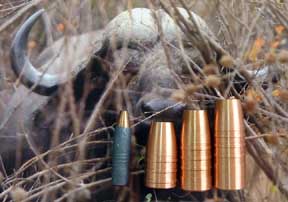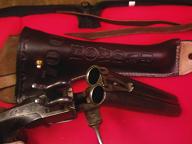

 The Accurate Reloading Forums
The Accurate Reloading Forums  THE ACCURATE RELOADING.COM FORUMS
THE ACCURATE RELOADING.COM FORUMS  Rifles
Rifles  Big Bores
Big Bores  Historical question-Baker's Two bore
Historical question-Baker's Two boreGo  | New  | Find  | Notify  | Tools  | Reply  |  |
| one of us |
I had previously heard of Sir Samuel Baker�s famous 2-bore, "baby". I am reading the second of two books about this man and his adventures when he began to refer to the rifle. It was a single shot rifle firing an 8oz bullet backed by 12 drachems (drams?) of powder.  Nothing I didn't know so far......then he wrote that the shells he fired out of them were exploding shells. Damn, 8oz of lead was bad enough but to have the ball explode, that had to hurt. (by the way one elephant took such a ball in the lungs and still ran over 100 yards) Questions; 1. Was this projectile basically a grenade (iron ball with a fuse detonator) or was it detonated by percussion and, 2. How much was the powder charge of the explosive? Of interest; I also read where he said an African Elephant couldn�t reliably be brought down by a frontal brain shot, so much for always believing someone just because they have �been there and done that�. The book did not illustrate where he shot this particular elephant but from his description all three rounds (from a #10 bore I believe) struck within a hands breadth of each other in the forehead. It sounds like he shot a few inches high. Last point, I really enjoyed his narration of his Arab companions (three men) attacking and killing Elephants with swords and harpooning bull hippo�s in the water without a boat. That�s a little more �sport� than I think I would enjoy.  If anyone can answer the above questions I would appreciate it. | ||
|
one of us |
Was the 10bore shooting soft lead slugs? Maybe he wasn't getting enough penetration? | |||
|
| one of us |
He was shooting lead conicals� with a mercury hardener added. These same bullets would pass through shoulder shots on buffalo and he had killed hundreds of Asian elephants with the same set up. Maybe the Asian elephant has a different brain location/ lower or higher ??? | |||
|
| one of us |
Or maybe the African Elephant has a thicker skull..... | |||
|
| one of us |
'Baby' sounds like a 19th century RPG! Bob | |||
|
| one of us |
Yes it does...I can't remember if they had percussion detonation tech in the 1850-1860's ....if not it was definitely a fuse detonated round. | |||
|
| one of us |
Baker's 'Baby' was a 4-bore, not a 2-bore. He had another couple made later, at least one of which still survives. They were all single-barrel hammer-guns. There is some good info on 'Baby' in a previous thread on this board. I'll try to find it later. Meanwhile, Hollands' "The Shooting Field" has a bit on it as well. | |||
|
| one of us |
I found these great pictures of 4 bore in afrcan-hunter.com The 500/465 solids are taken from elephant and the hard lead alloy solids are taken from the buffalo. it looks like grand sport      Cheers, Andr� | |||
|
| new member |
If you are interested in samuel Bakers writings, go to this sight and type in Baker,Samuel in the author box. http://www.gutenberg.net/cgi-bin/search/t9.cgi | |||
|
| one of us |
Quote: Uh-oh a disagreement...I will get you the book and page # citing that his "baby" fires a half pound lead ball....= 2 bore. I didn't get the info on the gun from a second hand source, Boddingtons "perfect shot placement" calls it a 4 bore. I just read Bakers own book about exploring the Nile where he speaks so fondly of his "Baby".....Of course I could be wrong, we shall see. | |||
|
| one of us |
See, a two bore........  < !--color--> < !--color--> From the Guttenburg site; In The Heart Of Africa By Sir Samuel W. Baker, M.A., F.R.G.S. Condensed By E.J.W From "The Nile Tributaries Of Abyssinia" And "The Albert N'yanza Great Basin Of The Nile." Here are the complete passages < !--color--> I was within fifteen paces of them, and so compactly were they packed that with all their immense strength they could not at once force so extensive a front through the tough and powerful branches of the dense kittar. For about half a minute they were absolutely checked, and they bored forward with all their might in their determination to open a road through the matted thorns. The elastic boughs, bent from their position, sprang back with dangerous force, and would have fractured the skull of any one who came within their sweep. A very large elephant was on the left flank, and for an instant he turned obliquely to the left. I quickly seized the opportunity and fired the "Baby," with an explosive shell, aimed far back in the flank, trusting that it would penetrate beneath the opposite shoulder. The recoil of the "Baby," loaded with ten drams of the strongest powder and a half-pound shell, spun me round like a top. It was difficult to say which was staggered the more severely, the elephant or myself. However, we both recovered, and I seized one of my double rifles, a Reilly No. 10, that was quickly pushed into my hand by my Tokroori, Hadji Ali. This was done just in time, as an elephant from the battled herd turned sharp round, and, with its immense ears cocked, charged down upon us with a scream of rage. "One of us she must have if I miss!" and.... < !--color--> We had very little time to examine the elephant, as we were far from home and the sun was already low. I felt convinced that the other elephant could not be far off, after having received the "Baby's" half-pound shell carefully directed, and I resolved to return on the following morning with many people and camels to divide the flesh. It was dark by the time we arrived at the tents, and the news immediately spread through the Arab camp that two elephants had been killed. On the following morning we started, and upon arrival at the dead elephant we followed the tracks of that wounded by the "Baby." The blood upon the bushes guided us in a few minutes to the spot where the elephant lay dead, at about three hundred yards' distance. The whole day passed in flaying the two animals and cutting off the flesh, which was packed in large gum sacks, with which the camels were loaded. I was curious to examine the effect of the half-pound shell. It had entered the flank on the right side, breaking the rib upon which it had exploded; it had then passed through the stomach and the lower portion of the lungs, both of which were terribly shattered; and breaking one of the fore-ribs on the left side, it had lodged beneath the skin of the shoulder. This was irresistible work, and the elephant had evidently dropped in a few minutes after having received the shell. and..... < !--color--> the ankles at every footstep. Still we crept forward, as the elephant alternately drank and then spouted the water in a shower over his colossal form; but just as we arrived within about fifty yards he happened to turn his head in our direction, and immediately perceived us. He cocked his enormous ears, gave a short trumpeting, and for an instant wavered in his determination whether to attack or fly; but as I rushed toward him with a shout, he turned toward the jungle, and I immediately fired a steady shot at the shoulder with the "Baby." As usual, the fearful recoil of the rifle, with a half-pound shell and twelve drams of powder, nearly threw me backward; but I saw the mark upon the elephant's shoulder, in an excellent line, although rather high. The only effect of the shot was to send him off at great speed toward the jungle. At the same moment the three aggageers came galloping | |||
|
| one of us |
Baker did have a 21 pound single shot 4 bore in his book the rifle and hound in Ceylon but he never called it baby. He also said it shot a 4 ounce ball = 4 bore | |||
|
| one of us |
. | |||
|
| one of us |
Also I don't think he ever called anything a 2 bore or even said half pound 'ball'. It was always half pound 'shell' which means it could have been any shape-like a longer conical type projectile of lesser calibre. Another point is the propellant charge is very light for what a 2 bore might take. Karl. | |||
|
| one of us |
What Karl said! A conical 'shell' has to be heavier than a round ball, although the bursting shells made for Baker were of lead-clad iron and carrying 1/2 ounce of fine powder. There have been some lengthy discussions on what the actual projectile diameter was for the 'standard' 4-bore of the day: it was not exact, some were just over an inch, some just under. Technically, Baker's Baby may have been closer to a three-bore than a four-bore, but the gun-industry of the day referred to them as 4-bores. In either case, Baker's big rifles were NOT 2-bores! By way of example for .44: In the 12-bore (.729 to .735 dia) A round ball is 1 1/3 ounce, around 585 grains. The Fosbery Paradox projectile is 1 3/4 ounces or 750 grains. The conical rifle projectile is over 2 1/4 ounces for 1000 grains. In the latter loading, .44's math would have the 12-bore rifle pegged as a 7-bore! | |||
|
| one of us |
Quote: I'll buy the "shell" being heavier therefore it was probably a 4 bore. Which math are you talking about??? | |||
|
| one of us |
. | |||
|
| one of us |
Alf, Great research and photo. I read somewhere also about a 2 bore owned by Gibbs. Which Gibbs (of rifle fame?) I don't know. It was posted here on the old software as a quote from another source. Wish I could remember what -possibly was an African novel referring innaccurately to a firearm or maybe even fiction. Ever heard of it? Karl. | |||
|
| one of us |
Quote: I guess if the first round didn't kill him you could hit him with it......  | |||
|
| <4biga1> |
Is there any information about Robert Ingle and his 3-Bore? If there is would you please post it. | ||
|
| one of us |
. | |||
|
| Powered by Social Strata |
| Please Wait. Your request is being processed... |
|
 The Accurate Reloading Forums
The Accurate Reloading Forums  THE ACCURATE RELOADING.COM FORUMS
THE ACCURATE RELOADING.COM FORUMS  Rifles
Rifles  Big Bores
Big Bores  Historical question-Baker's Two bore
Historical question-Baker's Two bore

Visit our on-line store for AR Memorabilia

